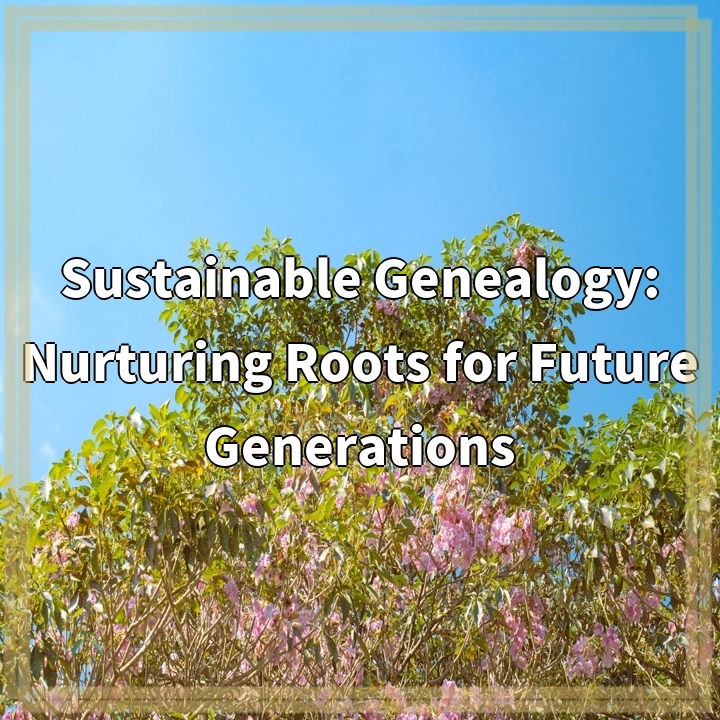
What is Sustainable Genealogy?
Sustainable genealogy refers to the practice of conducting genealogical research in an environmentally conscious and sustainable manner. It involves adopting methods and approaches that minimize the negative impact on the environment while preserving and sharing family history and heritage for future generations.
Real-World Problems Associated with Sustainable Genealogy
As genealogical research becomes more popular, it is crucial to address the environmental impact and challenges associated with this practice. Here are some real-world problems that arise:
1. Excessive Paper Usage
Paper has always been a significant component of genealogical research. However, the excessive consumption of paper in creating family trees, documenting lineage, and printing records has adverse ecological consequences. Deforestation, energy consumption, and waste generation contribute to environmental degradation.
2. Unsustainable Data Storage
Genealogical research often involves collecting and storing massive amounts of data, including digital records, photographs, and documents. Inadequate data management and storage practices can lead to energy-intensive server farms and excessive carbon emissions.
3. Travel-related Carbon Footprint
Researchers frequently travel to libraries, archives, and repositories located far away to access rare and valuable genealogical records. This extensive travel can contribute to greenhouse gas emissions, air pollution, and global warming.
4. Chemical Usage in Preservation
Preserving historical documents and photographs often involves the use of chemicals, such as adhesives, laminating materials, and pesticides. Improper disposal of these chemicals can contaminate water sources and harm ecosystems, creating long-term environmental consequences.
5. Lack of Digitization and Access
Many valuable genealogical resources remain inaccessible due to limited digitization efforts. Without proper digital preservation, these documents are vulnerable to physical deterioration and loss, hindering long-term accessibility for future generations.
In conclusion,
Sustainable genealogy aims to address these real-world environmental challenges and promote eco-friendly practices within the field. By adopting sustainable approaches, such as paperless documentation, responsible digitization efforts, mindful data management, eco-friendly preservation techniques, and reducing travel-related carbon footprint, we can ensure that the pursuit of our family history does not come at the expense of our planet’s well-being.

Solutions for Sustainable Genealogy
Addressing the environmental challenges in genealogical research requires adopting sustainable practices. Here are some solutions:
1. Digital Documentation and Storage
Transitioning to digital documentation reduces paper usage and the need for physical storage. Utilize genealogical software, cloud storage, and digital record repositories to store and organize family history data efficiently.
2. Responsible Paper Consumption
Minimize paper waste by printing only essential documents and using recycled or sustainably sourced paper. Consider alternative options, such as e-readers and tablets, for reading and referencing genealogical records.
3. Sustainable Data Management
Develop sustainable data management practices by regularly backing up data, deduplicating and organizing files, and implementing energy-efficient storage methods. This ensures data preservation while reducing environmental impact.
4. Virtual Access and Collaboration
Embrace virtual access to genealogical resources through online databases, digital archives, and collaborative platforms. This minimizes the need for physical travel and promotes global collaboration in research endeavors.
5. Eco-Friendly Preservation Techniques
Adopt environmentally friendly preservation methods, such as acid-free storage materials, non-toxic adhesives, and proper temperature and humidity control. Avoid using harmful chemicals that can harm both the documents and the environment.
6. Promote Digitization Efforts
Advocate for the digitization of valuable genealogical resources, making them accessible to a wider audience while reducing physical handling. Support initiatives that aim to preserve and digitize historical documents.
In conclusion,
By implementing these solutions, the field of genealogy can contribute to conservation efforts and lessen its environmental impact. Sustainable genealogy not only preserves our family histories but also ensures a greener and more sustainable future for generations to come.















